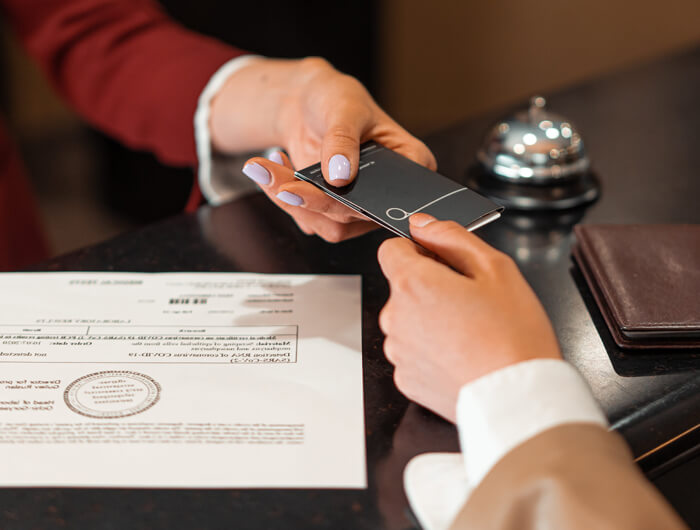Digital Tools and Platforms: Streamlining the Guest Screening Process

Nowadays, where property rentals, hotel reservations, and shared accommodations are at the forefront, ensuring the safety and reliability of guests has never been more crucial. Traditional methods of guest screening, reliant on manual processes and intuition, are giving way to sophisticated digital tools and platforms. The shift has not only improved efficiency but also added layers of verification, making the process more foolproof.
The Relevance of Digital Screening in Today’s World
The global travel industry is expanding, and with it, the need to accommodate numerous guests, ranging from vacationers to business travellers. With increasing numbers comes the responsibility to ensure the safety of property and other guests. Digitising the guest screening process addresses this need by:
Speed:
Digital methods process data in real-time or near-real-time, making the verification swift. This immediacy is invaluable in the hospitality sector, where last-minute bookings and tight turnarounds are common. By utilising digital platforms, hosts can expedite the approval process, thereby enhancing the guest’s experience and reducing vacancies.
Accuracy:
Minimised human intervention reduces errors and biases, leading to accurate results. Automated systems, by their nature, follow strict protocols and algorithms, eliminating the possibility of human error or subjective judgement. This precision ensures that all guests are assessed by the same criteria, creating a standardised screening process that upholds fairness and equality.
Scalability:
Digital platforms can handle a large number of screenings simultaneously, catering to industry growth. This aspect is particularly crucial in peak seasons when there is an influx of potential guests. These systems can effortlessly manage increased demand, ensuring no opportunity is missed and service levels remain consistent, regardless of volume.
Key Features of Effective Digital Guest Screening Platforms
Identity Verification:
Ensuring the person booking is who they claim is paramount. Modern tools cross-check identity details with various databases, offering a reliable verification. With the rise of identity fraud in digital platforms, these checks are becoming even more critical. They provide hosts with confidence that their guests are genuine, reducing potential liabilities and ensuring the safety of properties.
Background Checks:
Some advanced platforms integrate with public record databases, providing insights into a guest’s criminal or problematic history. This is especially important in maintaining the security and trustworthiness of a lodging community. A thorough background scan can prevent potential issues, ensuring that hosts are informed about who they’re accommodating.
Behavioural Analysis:
By studying patterns and digital footprints, platforms can predict the potential risk or behaviour of a guest. Beyond just past actions, this predictive analysis evaluates online behaviour, social media activity, and other digital trails to forecast future guest conduct. This form of analysis helps in identifying red flags before they become real problems.
Feedback Integration:
Past hosts’ reviews and feedback can be integrated, offering an extensive overview of a guest’s past behaviour. This collaborative approach leverages the collective experience of hosts, helping new ones make informed decisions. A guest’s history with other hosts can be a significant indicator of their etiquette, making this feedback an invaluable resource for screening.
The Role of Data Privacy
With the increasing dependence on digital tools, there’s a pertinent concern about data privacy. It’s imperative for screening platforms to comply with data protection regulations like GDPR and ensure that personal data is used solely for the intended purpose. Transparency in data usage and storage is non-negotiable in maintaining trust.
Benefits of Streamlined Digital Guest Screening
1. Enhanced Security:
Digital methods bolster safety by offering comprehensive insights, making it harder for unwanted incidents to occur.
2. Operational Efficiency:
By leveraging automation and advanced digital tools, organisations can decrease manual interventions, leading to notable cost reductions.
3. Informed Decision Making:
Using data-driven insights, hosts and property managers are equipped to make well-informed choices, optimising their operations.
4. Improved Guest Experience:
Efficient and dependable screenings enable hosts to speed up the booking process, thereby enhancing overall guest satisfaction.
Potential Challenges and Overcoming Them
However, like all tools, there are challenges:
– Dependence on Databases:
The accuracy of the results is tied to the accuracy of the database being used. Regular updates and cross-checking multiple sources can alleviate this.
– False Positives:
Occasionally, digital tools might flag a harmless guest as a potential threat. Regular audits and integrating human oversight can reduce such occurrences.
The Future of Guest Screening
As technology advances, so will the tools associated with guest screening. Artificial Intelligence and Machine Learning will play pivotal roles, predicting potential threats or challenges even more accurately. Biometric verifications might become a norm, and integration with global databases will ensure a nearly foolproof system.
Conclusion
Digital tools and platforms are not just a luxury or an add-on in the guest screening process. They are fast becoming the backbone of ensuring safety, reliability, and efficiency in the hospitality industry. As the world continues to shrink due to globalisation, these digital methods will serve as the gold standard, ensuring peace of mind for both hosts and guests.
In an industry where reputation and trust are paramount, investing in robust digital guest screening tools is not just advisable – it’s essential. By harnessing the power of these platforms, stakeholders can ensure a harmonious, safe, and profitable future in hospitality.
Suggested Read: Stay at a luxury Maldives resort






